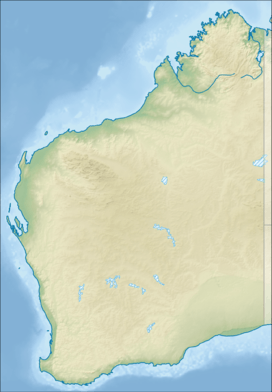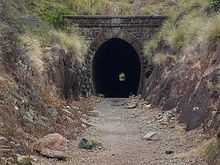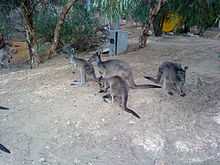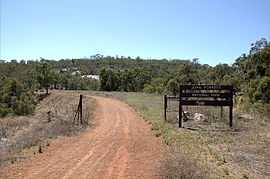John Forrest National Park
| John Forrest National Park Western Australia | |
|---|---|
|
IUCN category II (national park) | |
|
National Park western entrance | |
 John Forrest National Park | |
| Nearest town or city | Perth |
| Coordinates | 31°52′55″S 116°04′26″E / 31.88194°S 116.07389°ECoordinates: 31°52′55″S 116°04′26″E / 31.88194°S 116.07389°E |
| Established | 1957 |
| Area | 26.78 km2 (10.3 sq mi)[1] |
| Managing authorities | Department of Parks and Wildlife |
| Website | John Forrest National Park |
| Footnotes | Coordinates |
| See also |
List of protected areas of Western Australia |
John Forrest National Park is a national park in the Darling Scarp, 24 km east of Perth, Western Australia. It was the first national park in Western Australia and the second in Australia after Royal National Park.
Name
As early as 1898, the land was reserved for conservation and recreation. Two years later, it was named Greenmount National Park and several years later the name was changed to commemorate Sir John Forrest, the first Premier of Western Australia.[2]
Location
The park is on the edge of the Darling Scarp east of Perth, north of the Great Eastern Highway. The suburb to the west is known as Swan View with Pechey Road as a natural western boundary. To the south of the Great Eastern Highway the suburbs adjacent are Darlington and Glen Forrest. To the east Hovea is the adjacent suburb.
History
It was dissected by the Eastern Railway when it was constructed in the 1890s and rail traffic passed through until 1966, when the line was closed due to the opening of the Avon Valley route.

The alignment through the Swan View Tunnel and through the park was commonly known as the 'National Park' railway line.
During the Great Depression of the 1930s many features near the main park buildings were built as part of relief employment. Some have been restored. It also has a tavern. It was a very popular railway excursion location while the railway was in existence (1890s to 1960s). Initially Hovea was the nearest railway station but in 1936 the National Park railway station was built. Also often photographed were National Park Falls, and the Hovea Falls.
After the railway line was closed and removed the formation became part of the Railway Reserves Heritage Trail vested in the Mundaring Shire Council. The section within the park is now known as the John Forrest Heritage Trail. There are also the Glen Brook Walk Trail and the Eagle View Walk Trail within the park.
Current conditions

While larger kangaroos remain, significant populations of smaller marsupials have been decimated by foxes, feral cats and dogs in this park.
Drought and dieback have affected the jarrah forest within the park. At the edges of the park, introduced species of weed, and problematic vegetation threaten the integrity of the park.
Also with rationalising of staff within the Department of Environment and Conservation management, earlier levels of staffing on parks such as this one has been reduced to minimal levels.
Significant damaging bushfires occurred in the western and northern sections of the park in the 1990s and early 2000s. In November 2010 a bushfire, believed to have been deliberately lit, damaged a significant area of the park including part of the Eagle's View trail.
Access to the tavern and facilities area requires payment, whereas the scenic drive through the park remains free.
See also
Notes
References
- Elliot, Ian (1983). Mundaring - A History of the Shire (2nd ed. ed.). Mundaring: Mundaring Shire. ISBN 0-9592776-0-9.
- Watson, Lindsay (1995). The railway history of Midland Junction : commemorating the centenary of Midland Junction, 1895-1995. Swan View, W.A: L & S Drafting in association with the Shire of Swan and the Western Australian Light Railway Preservation Association. ISBN 0-646-24461-2.
Further reading
- (1939) Beautiful National Park : Darling Range, Western Australia. issued by the State Gardens Board, Perth, Western Australia.
External links
| Wikimedia Commons has media related to John Forrest National Park. |
- John Forrest National Park page at the Department of Parks and Wildlife website
